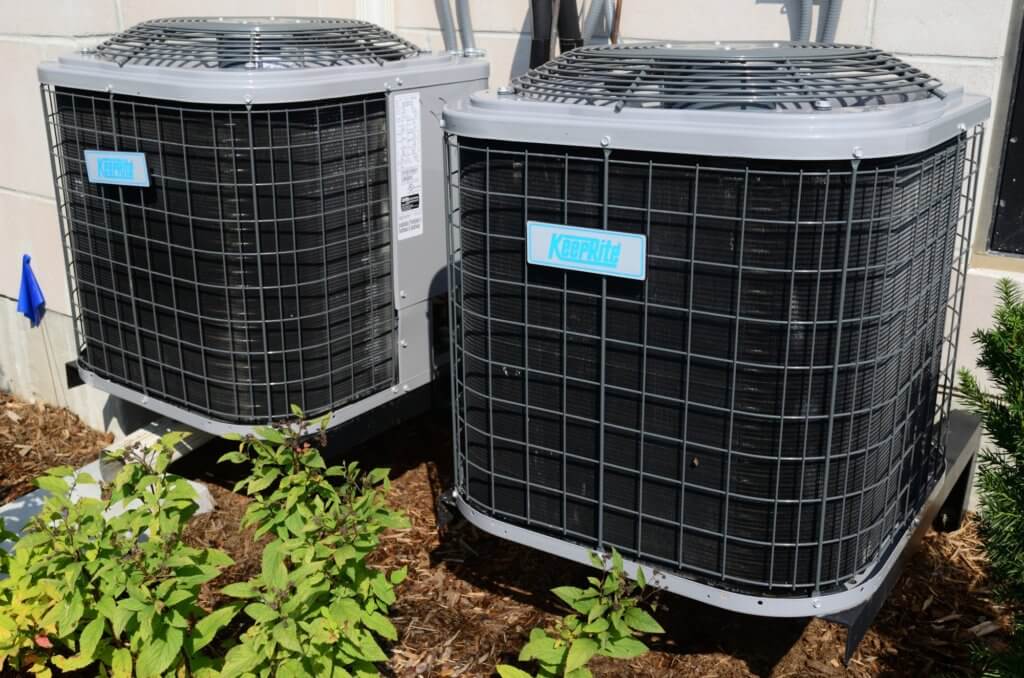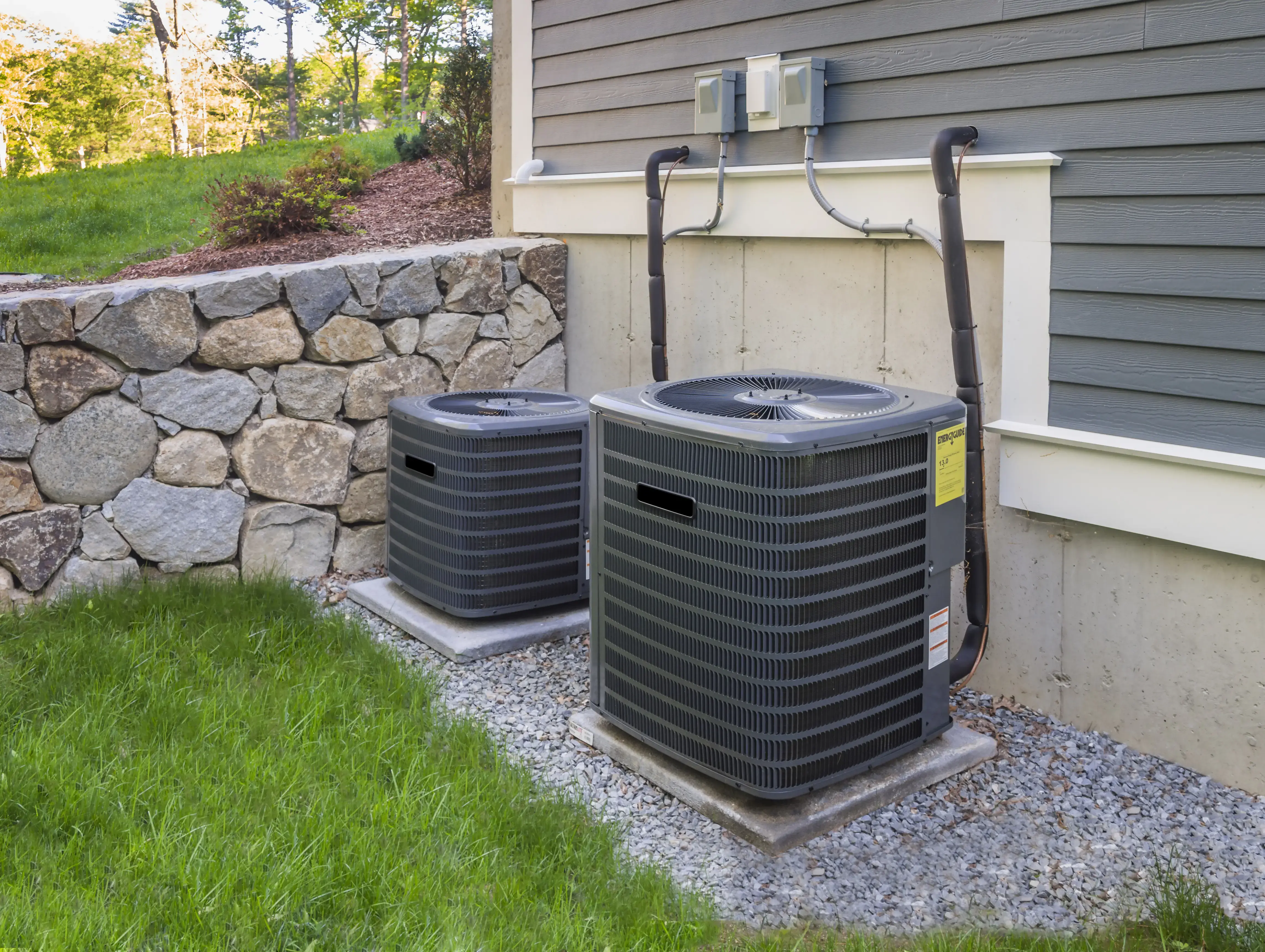Exploring the Vital Parts of an Efficient A/c System
An effective cooling and heating system is built on several vital elements that work in harmony. Each part, from the thermostat to the ductwork, plays an essential function in preserving comfort and energy efficiency. Recognizing these components is critical for maximizing efficiency and improving indoor air high quality. As one analyzes these components, the intricate partnerships in between them disclose understandings into boosting total system efficiency. What particular elements contribute most to this efficiency?
The Duty of the Thermostat in HVAC Performance
Although often forgotten, the thermostat plays an essential function in the efficiency of cooling and heating systems. HVAC experts. This tiny gadget serves as the primary nerve center, controling temperature setups and making sure optimal comfort within a space. By properly noticing the ambient temperature, the thermostat connects with the home heating, air flow, and air conditioning devices to preserve the preferred climate
An efficient thermostat reduces energy usage by triggering the heating and cooling system just when essential, thereby avoiding extreme home heating or air conditioning. Modern programmable and smart thermostats enhance this effectiveness additionally by permitting users to set routines and from another location change setups, adjusting to day-to-day regimens.
The positioning of the thermostat is essential; improper location can lead to unreliable temperature level readings, resulting in inefficient operation. Overall, a well-functioning thermostat not only boosts convenience yet additionally adds significantly to power cost savings and the longevity of the heating and cooling system.
Understanding the Importance of Air Filters
Air filters serve an essential feature in cooling and heating systems by assuring that the air circulating within a space continues to be tidy and healthy and balanced. These filters trap dirt, allergens, and other toxins, avoiding them from being recirculated throughout the environment. By recording these bits, air filters contribute to improved indoor air top quality, which can substantially benefit residents' health, specifically those with allergies or respiratory system conditions.
Furthermore, maintaining tidy air filters enhances the effectiveness of heating and cooling systems. Clogged filters can limit airflow, triggering the system to work more challenging to maintain wanted temperature levels, resulting in enhanced energy intake and higher energy costs. Consistently replacing or cleansing filters is an important upkeep step that can extend the life-span of heating and cooling tools. Ultimately, understanding the significance of air filters permits property owners and building supervisors to take aggressive steps to assure a well-functioning, efficient cooling and heating system that promotes a comfortable and risk-free indoor atmosphere.

The Capability of the Heating System and Heat Pump
Furnaces and warmth pumps are important components of HVAC systems, accountable for giving heat during chillier months. Heaters operate by heating air with burning or electric resistance, then distributing it throughout the home by means of air ducts. They usually offer fast heating and can be sustained by gas, electrical power, or oil, relying on the system type.
Alternatively, heat pumps transfer warmth rather than generate it. They remove heat from the outdoors air or ground, also in reduced temperature levels, and transfer it indoors. HVAC experts. This double performance permits heatpump to additionally offer air conditioning in warmer months, making them functional options for year-round climate control
Both systems require appropriate upkeep to ensure performance and long life. While heaters master extreme cold, heatpump can be useful in modest climates. Comprehending their unique functionalities help home owners in selecting the most suitable alternative for their home heating needs.
Discovering the Air Conditioning System
The cooling system is an important element of a/c systems, offered in different types to match various requirements. Understanding the efficiency rankings of these systems is necessary for making notified choices about power usage and cost. This area will explore the varied sorts of air conditioning unit and clarify just how effectiveness ratings influence performance.
Kinds Of Air Conditioners
While different elements affect the option of air conditioning systems, recognizing the different kinds offered is crucial for home owners and building supervisors alike. Central air conditioning conditioners are created to cool entire homes or structures, using a network of air ducts for air flow. Home window units supply an even more localized option, perfect for single spaces or small areas. Mobile air conditioners give versatility, permitting individuals to relocate the unit as required. Ductless mini-split systems are an additional choice, incorporating the efficiency of central systems with the comfort of zoning, as they call for no ductwork. Lastly, geothermal systems harness the planet's temperature level for energy-efficient cooling. Each type includes unique benefits, making informed options essential for effective climate control.

Performance Scores Discussed
Understanding effectiveness ratings is important for picking the right cooling unit, as these metrics supply understanding into the system's performance and power intake. The most typical ranking for air conditioning system is the Seasonal Energy Efficiency Ratio (SEER), which gauges the cooling result during a normal cooling period separated by the complete electrical energy input. A higher SEER suggests better effectiveness. In addition, the Energy Performance Ratio (EER) is used for determining effectiveness under details conditions. One more essential metric is the Power Celebrity qualification, which indicates that a system fulfills rigorous energy effectiveness standards. By evaluating these scores, consumers can make informed choices that not only optimize comfort but also decrease power costs and ecological impact.
The Relevance of Ductwork and Airflow
Effective ductwork style and air movement monitoring play essential roles in the total performance and efficiency of cooling and heating systems. Correct ductwork guarantees that conditioned air is distributed evenly throughout an area, reducing temperature level variations and enhancing convenience. Well-designed ducts lessen resistance to airflow, lowering the workload on cooling and heating equipment and ultimately lowering power usage.
Airflow monitoring involves purposefully putting vents and registers to enhance the flow of air. This avoids common concerns such as hot or cold areas, which can take place when air flow is obstructed or improperly balanced. Additionally, the right air duct materials and insulation can better enhance effectiveness by minimizing warm loss or gain throughout air transit.
A reliable ductwork system not only adds to energy savings yet can also extend the lifespan of HVAC equipment by lowering unnecessary pressure (HVAC experts). As a result, recognizing the importance of ductwork and air movement is crucial for accomplishing peak his response HVAC system efficiency
Regular Upkeep Practices to Boost Performance
Routine upkeep techniques are vital for guaranteeing peak efficiency of HVAC systems. These practices consist of routine inspections, cleaning, and required repair services to keep the system running efficiently. Regularly altering air filters is essential, as clogged filters can obstruct air flow and minimize performance. On top of that, technicians ought to check and clean evaporator and condenser coils to protect against overheating and energy wastage.
Annual specialist inspections are also recommended, as skilled specialists can determine prospective problems prior to they intensify. Lubing moving parts reduces deterioration, adding to a longer lifespan for the system. Guaranteeing that the thermostat operates properly help in keeping ideal temperature control.
Regularly Asked Inquiries
Just how Often Should I Replace My Thermostat?
Thermostats ought to usually be changed every 5 to ten years, depending upon use and technology advancements. Regular checks are suggested to assure peak performance, particularly if experiencing inconsistent temperature level control or boosted power expenses.
What Size Air Filter Is Finest for My HVAC System?
The finest size air filter for a HVAC system varies by device layout. Typically, it's vital to consult the proprietor's manual or check the existing filter dimensions to guarantee peak performance and air quality.
Can I Mount a Heatpump Myself?
Installing a warm pump individually is possible for knowledgeable people, but it calls for understanding of electric systems and regional codes. Hiring a professional is suggested to ensure correct setup and ideal system performance.
How Do I Know if My Ductwork Is Efficient?
To establish ductwork performance, one ought to look for leaks, step air movement at vents, examine insulation top quality, and assess temperature level differences between you can check here supply and return ducts. Specialist analyses can offer comprehensive understandings right into general performance.
What Are Indicators My HVAC Demands Immediate Maintenance?
Indications that a HVAC system requires immediate maintenance consist of unusual sounds, inconsistent temperature levels, boosted energy costs, undesirable smells, and regular cycling. Attending to these issues quickly can avoid additional damages and guarantee height system efficiency.
Air filters offer a necessary function in A/c systems by ensuring that the air distributing within a room stays healthy and balanced and tidy. In addition, maintaining tidy air filters enhances the performance of A/c systems. Ductless mini-split systems are one more option, combining the effectiveness of main systems with the benefit of zoning, learn this here now as they call for no ductwork. Understanding effectiveness ratings is important for selecting the best air conditioning system, as these metrics supply insight into the system's efficiency and power intake. The ideal size air filter for a Cooling and heating system varies by system layout.